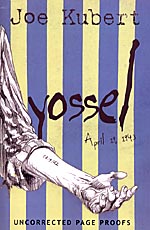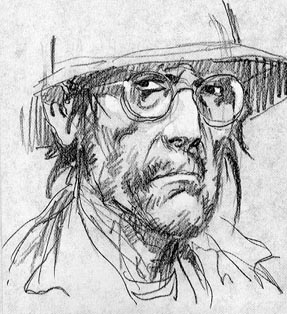 By Joe Kubert
By Joe Kubert
144 pages, black and white
Published by iBooks, Inc.
The “road not taken” is an endless source of interest to the general public? What if you had taken that new job offer? What if you hadn’t gone to the party where you met your future spouse? Sometimes the “what if” can be a lot grimmer, though. Famed comic creator Joe Kubert’s family came to America from Poland in the 1920s, but the family almost was not allowed into the country. With that in mind, his new graphic novel Yossel: April 19, 1943 asks the question, “What if my family had still been in Poland when the Warsaw Ghetto was founded?”
In 1939, Yossel and his family were relocated by the Nazis to a special section of Warsaw “for their protection”. Jews were in danger, they were told, and by all being kept in a single part of Warsaw, this would minimize their risk. What no one knew, though, is that this was only the first step of a so-called “Final Solution” to try and wipe out the Jewish population. As Yossel’s family is relocated to a camp, he finds himself a pet artists for the Nazis who are entranced by his drawings of superheroes, but all will change when a face from Yossel’s past tells the inhabitants of the Warsaw Ghetto what is really happening in the outside world.
In Kubert’s introduction to Yossel, he explains how his family’s persistence was the only reason they eventually made it into America instead of still living in Poland. It’s hard to imagine that by taking no for an answer, Kubert’s life would have probably mirrored that of Yossel’s. By basing Yossel on what really did happen in the Warsaw Ghetto, from its founding to the Warsaw Ghetto Uprising, Kubert’s able to add a level of drama and terror automatically to his graphic novel. Kubert knows that many people will already know the basic sequence of events of the Warsaw Ghetto Uprising, though, so he makes sure that by keeping the focus very tight and focused on Yossel himself, he can keep a level of suspense and dread running through the book. The reader will quickly care about Kubert’s alter-ego, and not knowing in advance what his or his family’s ultimate fate will be keeps the reader on the edge of their seat.
 Like Kubert himself, Yossel is an artist, and Yossel is told through his art as much as his words. Recognizing the limited resources that Yossel would have in the Warsaw Ghetto, Kubert drew the entire book entirely in pencils, foregoing inks entirely. While this may be a turnoff to some, I found it all the more entrancing. You gain an added sense of urgency here, rawness in Yossel’s attempts to tell his story that stares at you from the page. Even the level of detail changes from piece to piece, depending on the subject material. While crowd scenes and glimpses of the outside world are sketchy and rough, it’s the people that Yossel directly meets and interacts with that are fully fleshed out. They’re all that still exists in his world, and Kubert makes sure that these often-forgotten heroes are given a real life on the page. You can see in their eyes despair and dread, the horrors that they’ve seen reflected on their face. At the same time, there’s a real quiet nobility to these freedom fighters that struggle to stay alive in a time of no hope.
Like Kubert himself, Yossel is an artist, and Yossel is told through his art as much as his words. Recognizing the limited resources that Yossel would have in the Warsaw Ghetto, Kubert drew the entire book entirely in pencils, foregoing inks entirely. While this may be a turnoff to some, I found it all the more entrancing. You gain an added sense of urgency here, rawness in Yossel’s attempts to tell his story that stares at you from the page. Even the level of detail changes from piece to piece, depending on the subject material. While crowd scenes and glimpses of the outside world are sketchy and rough, it’s the people that Yossel directly meets and interacts with that are fully fleshed out. They’re all that still exists in his world, and Kubert makes sure that these often-forgotten heroes are given a real life on the page. You can see in their eyes despair and dread, the horrors that they’ve seen reflected on their face. At the same time, there’s a real quiet nobility to these freedom fighters that struggle to stay alive in a time of no hope.
Years ago I read a review that complained that by setting a story during the Holocaust, a creator doesn’t have to even try to create suspense or drama because the setting does it for them. Kubert doesn’t take the easy road out with Yossel, making sure that his newest book is meticulously crafted and works well in its own right.
Purchase Links: Amazon.com
